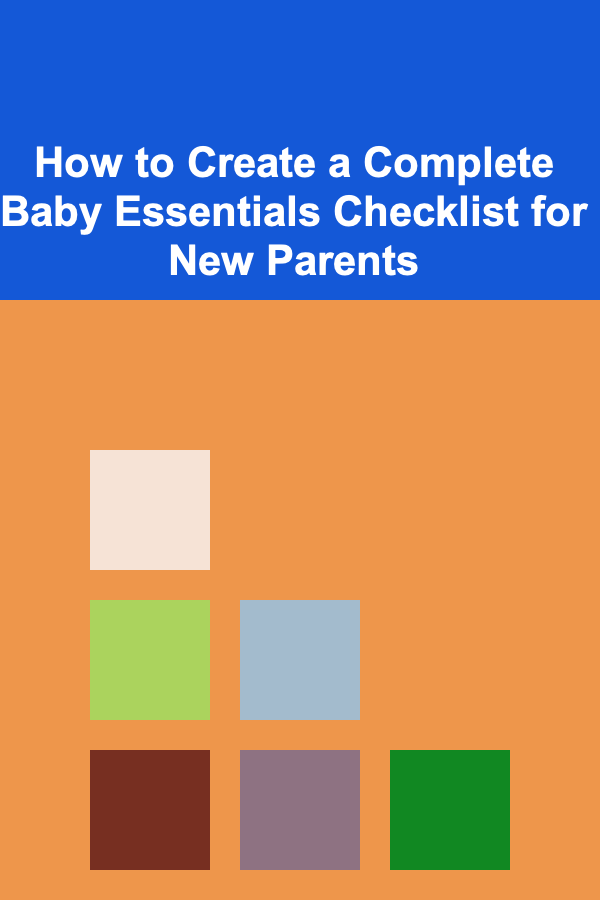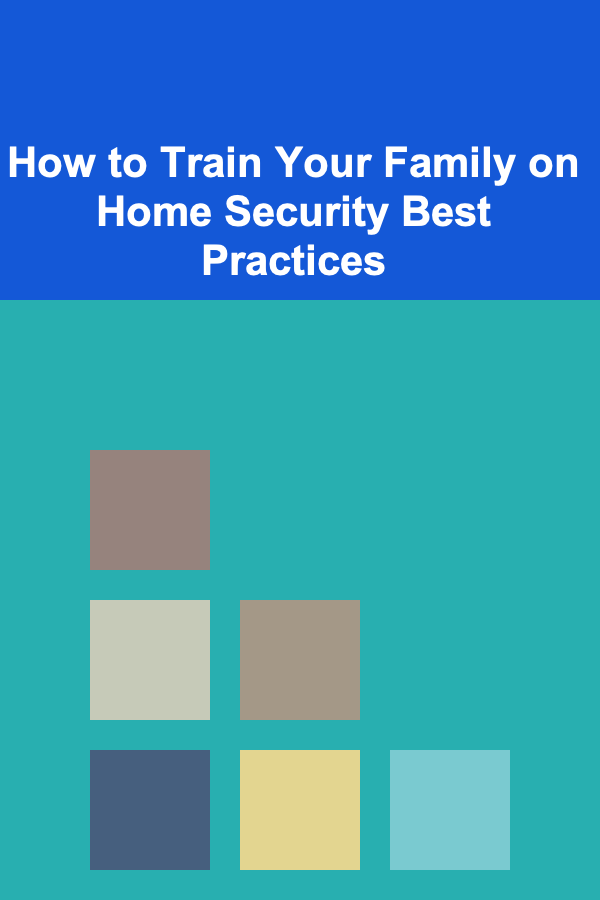
How to Create a Complete Baby Essentials Checklist for New Parents
ebook include PDF & Audio bundle (Micro Guide)
$12.99$11.99
Limited Time Offer! Order within the next:

Welcoming a baby into your life is an exciting, life-changing experience, but it can also be overwhelming. New parents often find themselves unsure of what to buy and what to prioritize. The vast number of baby products available can make the task seem daunting, and with so much to consider, it's easy to overlook important items. A comprehensive baby essentials checklist can help alleviate some of the stress and ensure that you have everything you need to take care of your newborn.
In this actionable guide, we will break down the essential items every new parent needs, categorized by different aspects of baby care, and offer advice on what to prioritize when preparing for your new arrival.
Baby Clothing Essentials
When it comes to baby clothing, comfort and ease are key. Babies grow quickly, so while it's important to have a sufficient wardrobe, don't overdo it with too many newborn-sized clothes. Here's a list of the essentials:
Key Items:
- Onesies (bodysuits): Soft, snap-button onesies are essential for daily wear and easy diaper changes. Aim for at least 6-8 onesies in various sizes.
- Sleepers/Pajamas: Babies need to sleep a lot, so having 5-7 soft, footed sleepers is a must. Look for those with easy access zippers for middle-of-the-night changes.
- Socks/Booties: Babies' feet can get cold, so having a few pairs of socks or booties will help keep them warm.
- Hats: Lightweight hats can help protect the baby's head from cold or sun. Choose soft cotton hats for comfort.
- Swaddle Blankets: These help comfort newborns and make them feel secure. You'll want 4-6 swaddle blankets or sleep sacks.
- Mittens: Babies have sharp nails that they may scratch themselves with, so mittens can protect their delicate skin.
Tips:
- Babies tend to grow out of newborn clothing quickly, so don't overbuy this size. Focus on a mix of newborn and 0-3 month sizes.
- Always opt for clothing that is easy to put on and take off. Clothes with snaps, zippers, or stretchable necklines are ideal for fuss-free dressing.
Diapering Supplies
Diapering is one of the most frequent tasks as a new parent, and you'll need to make sure you have all the necessary supplies for a smooth experience. Here's a breakdown of what you'll need:
Key Items:
- Diapers: Whether you go with disposable or cloth diapers, make sure to stock up. Newborns go through around 10-12 diapers a day. If you're using disposable, aim for at least 2-3 large packs of newborn diapers. For cloth diapers, you'll need about 20-24.
- Wipes: Soft, gentle wipes for cleaning your baby after diaper changes are essential. Have at least 4-6 packs of wipes ready.
- Diaper Rash Cream: A good diaper rash cream or ointment will help prevent and treat any irritation. Look for a zinc oxide-based cream, which is safe and effective.
- Changing Pad: A waterproof changing pad will make diaper changes more comfortable and hygienic. You can place it on a changing table, or use a portable changing mat for convenience.
- Diaper Bag: A diaper bag with multiple compartments is essential for carrying diapers, wipes, extra clothing, and snacks when you're on the go. Ensure it has a changing mat included.
Tips:
- Diapers come in different sizes, so you'll need to have a variety on hand. Avoid stocking too many newborn-size diapers, as babies tend to outgrow them quickly.
- Consider investing in a diaper subscription service if you prefer the convenience of having diapers delivered to your door.
Baby Feeding Essentials
Feeding your baby is a critical part of daily care, and whether you are breastfeeding or formula feeding, you'll need a variety of items to ensure your baby is properly nourished.
Key Items for Breastfeeding:
- Nursing Bras: These bras offer comfort and easy access for breastfeeding. Buy at least 2-3 bras to start.
- Nursing Pads: Disposable or washable nursing pads help protect your clothing from leaks.
- Breast Pump: A good breast pump is essential if you plan to express milk. Choose one that fits your needs, whether manual or electric.
- Breast Milk Storage Bags or Containers: For storing expressed milk, make sure to have storage bags or containers that are safe for freezing.
- Nipple Cream: A soothing nipple cream can help with discomfort or dryness during the early days of breastfeeding.
Key Items for Formula Feeding:
- Formula: Consult with your pediatrician to determine the best formula for your baby. Stock up on a few cans, but you'll likely need to buy more once you get a feel for how much your baby consumes.
- Bottles: Whether you're breastfeeding or formula feeding, bottles are necessary. Aim for 6-8 bottles in various sizes (newborn size and larger).
- Bottle Sterilizer: A sterilizer can make cleaning bottles and pacifiers easier and more efficient.
- Bottle Warmer: If you plan to bottle-feed, a bottle warmer can quickly heat milk to the right temperature.
Tips:
- For breastfeeding, seek help from a lactation consultant if you encounter any issues with latching or milk production.
- If you choose formula feeding, always have a few ready-to-use bottles or cans of formula on hand for emergencies or when you need convenience.
Sleeping Essentials
Newborns spend a lot of time sleeping, and it's important to ensure that your baby sleeps safely and comfortably. Here's a checklist of what you'll need for safe sleep:
Key Items:
- Crib or Bassinet: Ensure your baby has a safe sleeping space. A bassinet is a good option for the first few months, as it allows for easy access during nighttime feedings.
- Mattress: A firm mattress that fits snugly in the crib or bassinet is essential for safety.
- Fitted Crib Sheets: Soft, fitted sheets that are easy to wash and change are essential for baby sleep.
- Sleep Sack: A wearable blanket or sleep sack is an excellent alternative to loose blankets, which can be a suffocation hazard.
- Baby Monitor: A video or audio baby monitor will give you peace of mind while your baby sleeps in another room.
Tips:
- Always place your baby on their back to sleep, and avoid pillows, stuffed animals, or loose blankets in the crib to reduce the risk of suffocation.
- Keep the room at a comfortable temperature. Overheating can increase the risk of sudden infant death syndrome (SIDS).
Health and Safety Essentials
Ensuring your baby's health and safety is a priority. From infant care products to baby-proofing your home, here's a list of essential items:
Key Items:
- Thermometer: A digital thermometer is essential for checking your baby's temperature if they feel unwell.
- Baby First Aid Kit: A first aid kit designed for babies will have items like bandages, antiseptic wipes, and nasal aspirators.
- Infant Car Seat: A high-quality, rear-facing car seat is a must for safe travel. Ensure it meets safety standards and is appropriate for your baby's size.
- Baby-Proofing Supplies: You'll need baby gates, outlet covers, cabinet locks, and corner protectors to keep your baby safe as they start crawling and exploring.
Tips:
- Always ensure your car seat is properly installed, either by following the manufacturer's instructions or by having it inspected by a certified technician.
- Keep your first aid kit fully stocked and easily accessible.
Baby Gear and Miscellaneous Essentials
As your baby grows, you'll need additional gear to make day-to-day life more manageable and enjoyable. Some of these items may not be immediate needs, but they'll become invaluable as time goes on.
Key Items:
- Stroller: A stroller will be essential for outings and walks. Choose one that fits your lifestyle, whether you need a lightweight, travel-friendly option or a more robust model for long walks.
- Baby Carrier: A baby carrier allows you to keep your baby close while keeping your hands free. This can be especially useful when you need to do chores or go out for a walk.
- High Chair: When your baby starts eating solids (around 6 months), a high chair will be needed for mealtime.
- Toys and Books: Babies benefit from sensory toys and books that stimulate their senses and help with development.
Tips:
- Look for strollers that are easy to fold and maneuver, especially if you plan on using public transportation.
- A baby carrier can help calm a fussy baby and make bonding time more interactive.
Conclusion
Preparing for a new baby can feel like an overwhelming task, but with a comprehensive checklist, you can ensure that you're well-equipped for the early days. From clothing and feeding essentials to safety gear and sleeping arrangements, every item on this list plays a crucial role in helping you care for your newborn. Be sure to prioritize your purchases based on your specific needs and preferences, and remember that you can always buy more items as your baby grows.
The journey of parenthood is one of love, discovery, and plenty of challenges. With the right baby essentials, you'll be better prepared to navigate this exciting chapter of your life with confidence and joy.

How to Clean Your Home Efficiently in Just 30 Minutes a Day
Read More
How to Store Bedding and Linens in a Space-Saving Way
Read More
How to Store Delicate Seasonal Fabrics Safely
Read More
How to Train Your Family on Home Security Best Practices
Read More
Navigating Compliance in Transportation Operations as a Coordinator: An Actionable Guide
Read More
The Empowered Parent: Trusting Your Instincts, Raising Confident Kids
Read MoreOther Products

How to Clean Your Home Efficiently in Just 30 Minutes a Day
Read More
How to Store Bedding and Linens in a Space-Saving Way
Read More
How to Store Delicate Seasonal Fabrics Safely
Read More
How to Train Your Family on Home Security Best Practices
Read More
Navigating Compliance in Transportation Operations as a Coordinator: An Actionable Guide
Read More